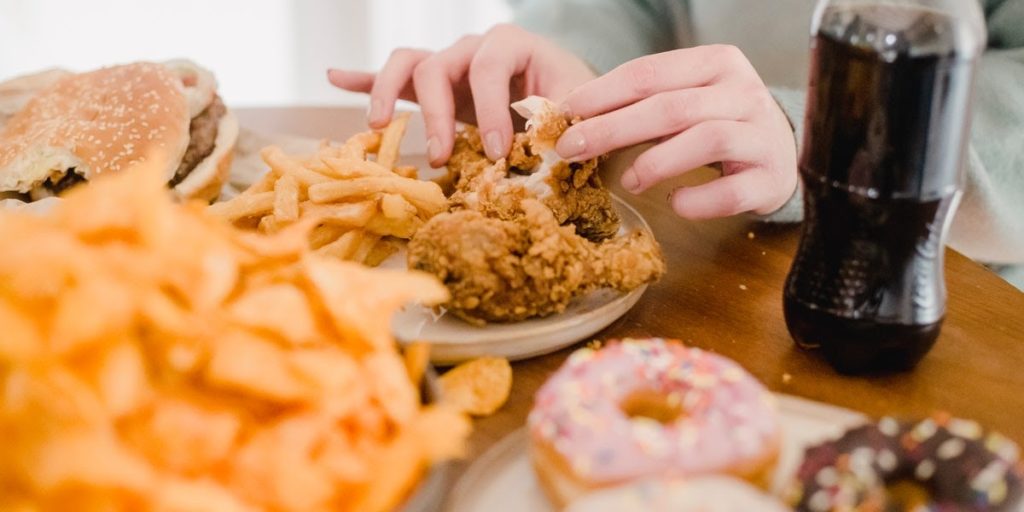Most people binge from time to time, especially during the holidays. But binging on a regular basis can put your health at risk by increasing body fat, disrupting hunger regulation, and impairing brain function.
There’s also another problem with overeating – it’s a red flag for binge eating disorder (BED). While not everyone who binges has an eating disorder, these unhealthy habits can escalate into a bigger problem.
Let’s learn more about what justifies binge eating, why it happens, and how to know when it has progressed into a full-blown eating disorder.
What Is Considered a ‘Binge Eat?’
Binge eating involves consuming large amounts of food in a short period of time, even when you’re not hungry. Almost everyone overeats once in a while, especially on the holidays and other special occasions. But doing this too much can become a disorder.
Binge eating isn’t just a physical problem – it can also be an emotional one. People who regularly binge eat often feel out of control while they’re binging and a sense of shame or guilt afterward. Sometimes, they develop anxiety or depression as a result of this cycle.
So how do you know when your overeating has progressed from an occasional overindulgence to a serious binging issue? If you’re concerned about your relationship with food, it’s best to seek help and get the treatment you need.
If You’re Binge Eating, What Is the Reason?
If you are overeating on a regular basis, it’s important to figure out why. Eating disorders are complex mental health conditions that stem from deeper issues – they are not just about food. Therefore, if you feel that you are using food to cope or control situations, you’ll need to dig deeper into why this might be the case.
Here are some common reasons why people binge eat:
- Genetics: Eating disorders tend to run in families. Research shows that certain genes that affect eating behaviors can be passed down through families.
- Environment: If you grew up in a household where people regularly overate, you’re more likely to develop the same behaviors.
- Mental Illness: Suffering from a mental health condition like anxiety or depression can cause you to use food to cope. Food makes us feel good, so it can be a temporary distraction from your feelings.
- Low Self-Esteem: Having low self-esteem can start the cycle of eating to feel good, then feeling guilty about your image, and then binging to feel better.
- Stress: You may also use food to cope with stress, especially after a major life event like losing a job or going through a divorce.
How Do I Know if I Have Binge Eating Disorder?
Occasional binging isn’t a cause for concern, but frequent binging is. Not only can this negatively affect your physical health, but also it could indicate the presence of a mental health condition. Here are some ways to tell if your binging has crossed the lines:
- Eating unusually large amounts of food in less than two hours
- Eating rapidly during binge episodes
- Feeling depressed, disgusted, and ashamed about your eating
- Feeling that your eating is out of control
- Frequently eating alone or in secrecy
- Getting uncomfortably full when you binge
It’s also important to point out that binge eating disorder is different from bulimia in the fact that it doesn’t involve purging behaviors. This is why people with the condition are often overweight or obese, though it is possible to be at a normal weight.
Tips for Controlling Binges
If you believe that you have a binge eating disorder (or another eating disorder), work with a doctor to get well. Eating disorders are serious and often require formal treatment and sometimes medication.
There are also ways that you can take control of your eating habits. Start by keeping a food diary so that you can look for patterns in your eating. Do certain feelings or emotions trigger you to binge? How do you feel before and after the binge?
It’s important to eat regular snacks and meals throughout the day to prevent hunger and keep your blood sugar levels stable. And don’t forget to portion out your food. Put a serving of crackers on your plate as opposed to sitting down with the whole box.
Get Treatment for a Binge Eating Disorder Today
Breathe Life Healing Centers offers inpatient and outpatient treatment for eating disorders. Our treatment centers are conveniently located in Los Angeles and provide evidence-based therapies, medical stabilization, nutrition education, and more. Let us get you back on track with healthy eating and living. Contact us today to start your journey.













